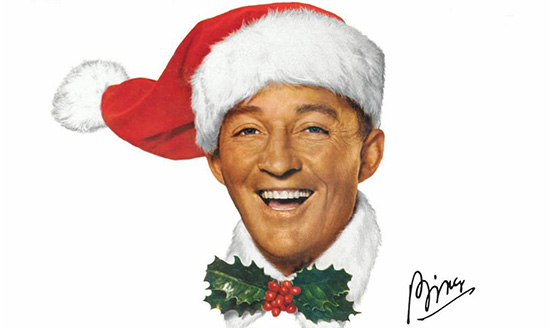Classic Hollywood: Bing Crosby

Pop music is littered with One-Hit Wonders. Movie stars are hot…until they’re not. And then there’s Bing Crosby, who reigned for nearly 50 years atop a multimedia empire few performers can rival.
It began in the 1930s, when Bing shot to fame as a radio crooner, then signed a contract with Paramount to try his luck at acting. In the 1940s, while continuing to dominate the airwaves, Bing launched the seven-picture Road franchise with Bob Hope, won an Oscar for Going My Way, recorded the top-selling tune of all time (“White Christmas”), and endeared himself forever to the WWII soldiers he entertained around the world.
By the ‘50s, there were more hit films (The Country Girl, White Christmas, High Society). Tragic losses (wife Dixie died of cancer at age 42 in 1952). New beginnings (he married actress Kathryn Grant in 1957, adding three kids to the four-boy brood he and Dixie raised). In the ‘60s and ‘70s, Bing guest-starred on TV shows, shilled orange juice in Minute Maid commercials, and cast his family in his annual Christmas specials, the last of which included a duet by Bing and (I kid you not) David Bowie.
Then, on October 14, 1977, just two months after Elvis permanently left the building, Bing died of a massive heart attack on a golf course in Madrid. He was 74.
Six years after Bing’s death, his eldest son Gary wrote a tell-all book called Going My Own Way. Dubbed Daddy Dearest (after Christina Crawford’s scathing exposé of her mother Joan), the memoir claimed that Bing was a heartless tyrant who physically and emotionally abused his kids. Sadly, although Bing’s “second” family refuted Gary’s allegations, two of Bing and Dixie’s children committed suicide in their fifties, while Gary and brother Phillip succumbed to illnesses in their sixties.
One fact that’s never been in dispute? Bing’s impact on show biz. He truly was a global phenomenon who conquered every medium and entertained generations of fans. Even now, if you Google Bing’s name, you will get 15,400,000 results. Nobody’s sold more #1 singles (41), including Elvis and The Beatles. What made Bing so special, and his popularity so enduring?
The answer begins and ends with Bing’s amazing voice. He didn’t belt out songs like Al Jolson. He created a sense of intimacy with listeners, practically purring lyrics in his often imitated boo-boo-boo-boo style. Bing’s warm baritone, said his idol and close friend Louis Armstrong, “was like gold being poured out of a cup.”
Plus: Bing made everything look easy. Yet in A Pocketful of Dreams, the first entry in a three-volume “Bing”-ography (heh!) by Gary Giddins, swing legend Artie Shaw sensed something behind that casual facade: “It was a tense sort of relaxing because you knew he was working at it. Bing wasn’t Bing any more than Bogart was Bogart,” but conceded, “The thing you have to understand about Bing Crosby is that he was the first hip white person born in the United States.”
To get the inside track on Bing’s iconic career, stream the PBS special, American Masters: Bing Crosby Rediscovered, featuring revealing interviews and never-before-seen clips of the entertainer in action.
Classic Hollywood posts appear bimonthly on The Music Hall blog.
